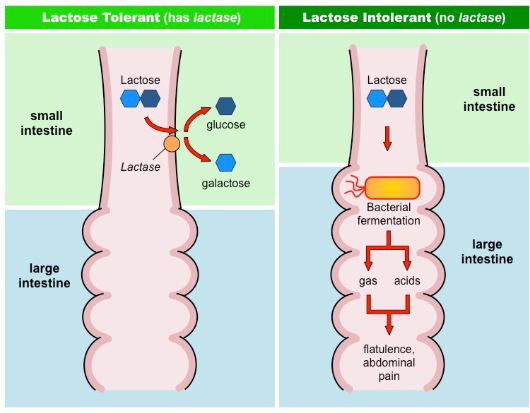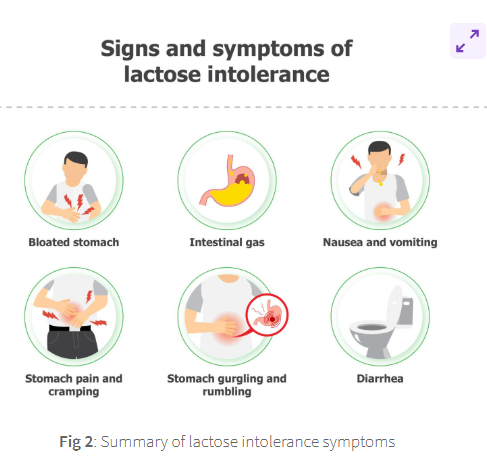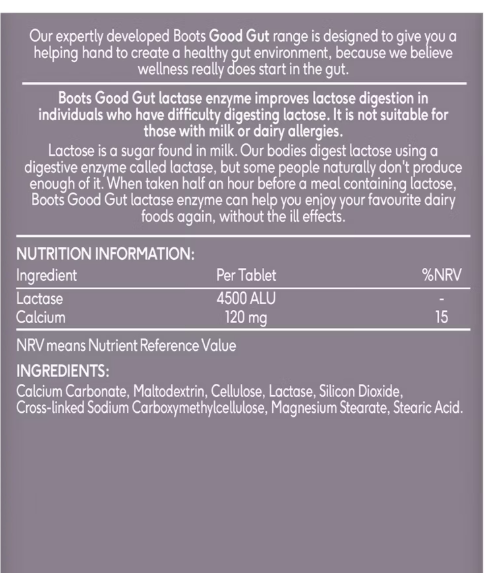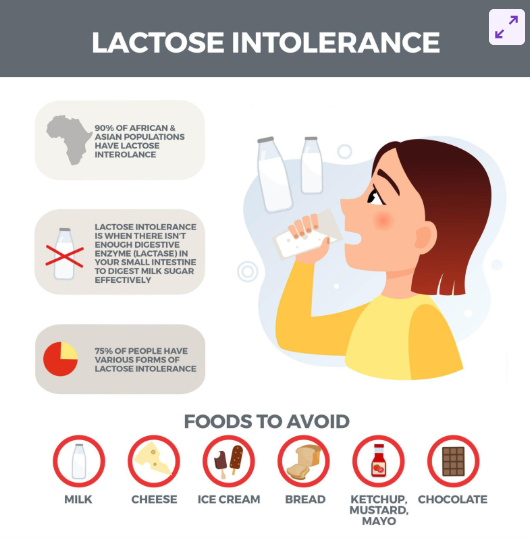8.0 Lactose intolerance
1/20
There's no tags or description
Looks like no tags are added yet.
Name | Mastery | Learn | Test | Matching | Spaced | Call with Kai |
|---|
No analytics yet
Send a link to your students to track their progress
21 Terms

lactose intolerance
the inability to digest the sugar in milk and dairy products
due to insufficient levels of the enzyme lactase causing
bloating,
diarrhoea,
gas a
nd stomach pain after consuming dairy products
lactose intolerance occurs when the body cant break down or digest lactose, the sugar present in milk/dairy
this condition stems from a deificiency of the enzyme lactase, responsible for breaking down lactose into glucose and galactose
lactose
a disaccharide that is a major carbohydrate in the milk of most mammals
the gene responsible for the production of lactase enzyme is expressed in the entercytes lining of the small intestins
Babies and young children have a lot of lactase enzyme.
After weaning the expression of the gene that produces lactase is down-regulated
resulting in less lactase production.
this is population specific and some population groups tend to have continued elevated lactase activity throughout their life.
This can be linked to population groups that consume the milk of domesticated cows and other mammals.
lactase production is reduced,
resulting in lactose not being broken down into absorbable glucose and galactose then the lactose moves further down the GI tract and into the colon
At this site the gut flora ferments the lactose → mixture of hydrogen gas + carbon dioxide + methane
resulting in bloating.
The fermentation process also results in production of short chain fatty acids which cannot be absorbed.
The resultant mix of lactose and its fermentation products increases osmotic pressure
increasing water influx into the colon leading to diarrhoea.
Why there is normally a down-regulation of the gene responsible for lactase production at ages 3-5 and how this varies with different populations.
because at the start of your life milk is all you ingets
after weaning the production of lactase need not be so high
caucasians have resistant lactases production into adulthood
think group historyically domesticated cows n whv n natural selection thinks lactase persistence whv
How an excess of lactose in the colon can result in excess gas (bloating) and diarrhoea.
when theres an underproduction of lactase the majority of lactose is not split and absorbed, as much as 75%
lactose continues down the GI tract into the colon where the gut flora microbes ferment the lactose into H2 (g) and CO2 (g) and CH4(g)
these gases contribute to the symptoms of gas and bloating
short chain fatty acids are also produced from lactose fermentation which remain in the lumen of the gut, not absorbed
unabsorbed lactose + fatty acid chains raise osmotic pressure, making water move INTO the bowels → diarrhoea
What is temporary lactose intolerance and how does this arise?
a result of infection or inflammation of the small intestine where the micro villi are flattened/ damaged (this is site of lactase production)
causes of lactose intolerance, other than a lack of lactase
IBD
coeliac disease- the immune system attacks your own tissue when you eat gluten damaging your small intestine so your body cant properly intake nutrients
bowel infections
bowel surgery
injury to the bowel

symptoms occurs within a few horus of consumption
flatulence (wind)
diarrhoea
bloated stomach
stomach cramps + pain
stomach rumbling
feeling sick
severity to symptoms depends on the amount of lactose consumed
some people may be able to drink small glass of milk without triggering symptoms
testing for lactose intolerance
eliminate lactose from diet to see if results improve
hydrogen breath test where breath is tested for hydrogen to see how well lactose is digested
blood test to measure blood glucose levels after drinking lactose solution- a lactose intoelrant person will show low glucose levels as lactose would not be broken down
most standard treatment for lactose intolerance
reducing lactose consumption
lactose supplements
wrk by replacing or supplementing the body’s defiecnt lactase enzymes
Clinical considerations include individual response,
as some people may still experience symptoms if the lactase dose is insufficient for the lactose load.

Lactase enzyme supplements are generally well-tolerated with few side effects.
. Rarely, patients might experience gastrointestinal upset, but this is usually mild. The effectiveness of lactase supplements can vary, so if symptoms persist, the dose may need adjustment.

further reading